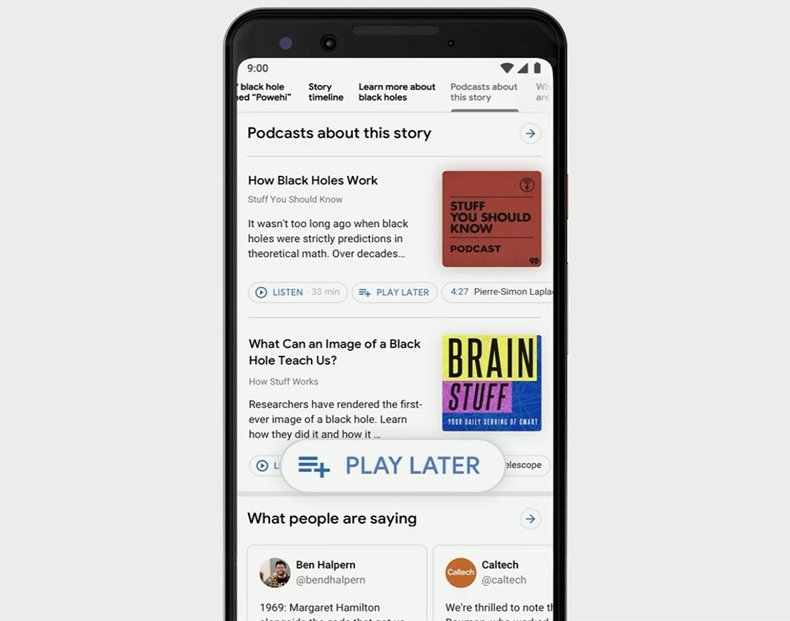During the 2019 Google I/O developer conference, Google CEO Sundar Pichai announced that Google will begin to add podcasts to search results. This is big news not only for the podcasting industry but also for marketers, SEO professionals, and content creators.
The announcement has been over a year in the making, and it's part of a multipronged approach to fix some of podcasting's ongoing issues.
A Quick History of Google's Investments in Podcasting
In 2018, Google announced its podcast aspirations in a series of blog posts about how it's making audio a first-class content citizen. Google's head of product for podcasts, Zach Reneau-Wedeen, wrote about the company's ambitious goals to double the global podcast audience and its intent to integrate podcasts throughout Google products.
Besides these articles, Google rolled out three huge initiatives to help solve three problems in podcasting: attracting new listeners, attracting new content creators, and generating better discoverability. Those initiatives were the following:
- Creating a dedicated Google Podcast app
- Surfacing podcast content in search results
- Establishing a partnership with PRX for the Google Podcast creator program
The dedicated app has the potential to bring in millions of new podcast listeners. Most smartphones are Android, but the vast majority of podcast downloads come from Apple's iTunes. As Reneau-Wedeen notes, "It's actually so egregious that on a device-by-device basis, the average iPhone listens to over ten times more podcasting than the average Android."( Inside The New Google Podcast Strategy That Could Double Audiences Worldwide). Adding a dedicated, preinstalled app on Android phones will help convert Android users into podcast listeners.
Google's partnership with PRX is bringing new and underrepresented voices to podcasting by providing seed funding and mentorship to amateur podcasters. Funding the creation of more content that appeals to a wider range of people will help to inspire a new generation of podcast producers.
Adding podcast content to search results is helping to tackle the notoriously difficult discoverability problem. It will change how podcasts get discovered, with repercussions for SEO and content strategy in general.

An Overview of Google's Podcast Update
I reached out to the SEO team at HubSpot to get their take on how marketers and SEO professionals can best take advantage of Google's plan to add podcast content to search results.
The first question from SEO professionals is, What data is Google crawling? For years, Google was indexing the names of podcasts and potentially the show description—the SEO equivalent of looking at only the title of a blog post.
Earlier this year, Google's podcast app began transcribing all podcast content. That is no small feat: It allows for a massive improvement in the data, and therefore the quality of search. Google will be looking at what podcasts are about as well as the content for each episode.
Take the company Third Love, for example. If I wanted to listen to our podcast interview with the founder and I search "Third Love Interview," I'm currently presented with a series of videos. If I search, "Podcast Third Love interview," I see The Growth Show's main page and a list of some of our most recent episodes.
In the future, Google will most likely be adding audio carousels in the same way it has added videos and news.
How Google's Addition of Podcasts Will Affect SEO Strategy
With regard to SEO, there's limited space on the first page of Google search results. HubSpot's SEO strategist Aja Frost explains what the addition of podcasts would mean: "This will definitely have an impact on SEO. Search is a zero-sum game—there's a set amount of space on the SERP, so every new search feature, like a podcast carousel, means there's less space for the traditional blue links."
The people who will immediately benefit are the folks who've built up years of podcast content with search-friendly topics and clear titles. As Google adds podcast content to search results, the initial winners are going to be those with a huge library of content to crawl. Gary Vaynerchuk, for example, has been podcasting for years; he has produced over 300 episodes and garnered over 10,000 reviews.
The next wave of beneficiaries will be people who invest heavily in developing podcast content that's intended to be discovered by search engines. The strategies marketers have used to optimize their websites, videos, images, and so on will now be applied to podcasts as well.
Frost explains: "Like every evolution in search, there'll probably be an early land grab, followed by increasing competitiveness/saturation. In other words, you'll see a big uptick in podcasts produced specifically to rank. The first ones will rank fairly easily; then it'll get a lot harder."
Podcast are not like text or videos. What makes a good podcast can be considerably different from what makes a successful article. Marketing professionals and producers are going to have to figure out a way to make content that works for both podcast listeners and search engines.
How Search Will Change Podcasts Content
If you read the reactions from people in the podcast industry, it would appear as if there are no downsides to adding audio content to search. Many in the old guard of podcasting are in for a rude awakening, however.
Search is one of the most important pieces of marketing real estate for businesses. Since search is a zero-sum game, businesses will fight for that space. Many companies will employ SEO teams to systematically target keyword-rich areas and develop podcasts accordingly. To optimize for search, savvy search-focused podcasters will challenge the norms of the medium.
Here are changes to podcast formats I think we'll see:
- Podcast show and episode titles alignment to keywords
- Semi-subtle keyword stuffing in episode and show descriptions
- Significantly shorter episodes to increase ranking opportunities
- Hosts who'll be giving long, keyword-stuffed intros for each episode
In the short term, Google's move will be a huge boost for amateur podcasters. The longer-term view? As agencies, companies, platforms, and production houses develop their own podcast SEO strategies, middle-class podcasters will be pushed out.
Soon, podcasts will be discoverable outside of Top 100 lists and word-of-mouth recommendations. This development will fundamentally change the medium. The current moment will be seen as either a rising tide that lifts all boats or a giant wave that pushes podcasting into corporate waters.




